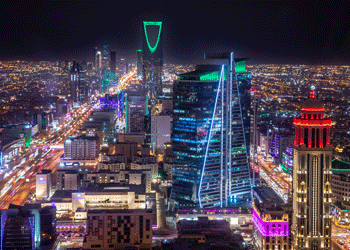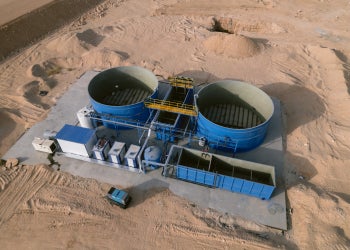Top 10 UAE clean energy projects
18 October 2023

Register for MEED's guest programme
The UAE is expected to showcase its growing green credentials at the Cop28 climate summit, which starts on 30 November in Dubai.
In addition to gradually phasing out fossil fuel subsidies and eliminating methane flaring, UAE-based energy and utility companies have mobilised multibillion-dollar public and private investments in utility-scale clean and renewable energy plants, reverse osmosis technology-based water desalination plants and carbon capture, utilisation and storage (CCUS) projects.
These projects aim to reduce harmful emissions – mainly carbon dioxide – offsetting the environmental impact of the country’s oil industry while it aims to meet its nationally determined contributions (NDCs) for the Paris Agreement, its energy diversification agenda set in 2017, as well as its 2050 net-zero target.
Barakah nuclear power plant
Three of the four reactors at the $29bn Barakah nuclear power plant, located close to the UAE’s border with Saudi Arabia, are operational. Each unit can produce 1,400MW of electricity. The UAE is also looking for opportunities to export its nuclear expertise by investing in and developing nuclear power plants overseas.
Mohammed bin Rashid al-Maktoum Solar Park
The UAE’s first and largest solar photovoltaic (PV) installation is located 50 kilometres away from the Cop28 venue. Nearly all the first five phases of the solar park are operational, with a total combined installed capacity of more than 2.4GW. The project’s fourth phase, probably the world’s largest hybrid solar PV and concentrated solar power plant, is nearing completion. The contract to develop the project’s sixth phase, which is designed to have an installed capacity of 1.8GW, has been awarded this year.
Sweihan and Al-Dhafra solar power plants
Abu Dhabi’s first solar PV plant, the 935MW Sweihan independent power project (IPP), began operating in 2019. The UAE capital’s second utility-scale solar PV IPP in Al-Dhafra, which has a capacity of 1.5GW, is expected to be inaugurated imminently. Emirates Water & Electricity Company (Ewec) received world-record-low tariffs, as has Dubai Electricity & Water Authority (Dewa), for these projects.
Taweelah reverse osmosis facility
With a capacity of 200 million imperial gallons a day, the plant is the world’s largest reverse osmosis-based water desalination facility. Half of the plant’s capacity was completed in 2022, with the other half now in the final commissioning stage. Taweelah is the country’s first independent water producer project, which resulted from the drive to decouple water and power production as a key initiative to decarbonise both sectors.
Reyadah CCUS
Abu Dhabi National Oil Company (Adnoc) and Abu Dhabi Future Energy Company (Masdar) have been operating the Al-Reyadah carbon capture, utilisation and storage (CCUS) facility since 2016. It can capture up to 800,000 tonnes a year (t/y) of carbon dioxide. About 240,000 tonnes of carbon dioxide (CO2), collected by Al-Reyadah from Emirates Steel Industries, has been injected into Adnoc's reservoirs at its Rumaitha and Bab oil fields to bolster oil recovery.
The project is in line with Adnoc’s commitment to decarbonise its operations, reduce its carbon intensity by 25 per cent by 2030, and deliver on its net zero by 2045 goal. Adnoc estimates the volume of CO2 being locked away underground daily through CCUS deployment across its reservoirs is equivalent to the emissions of more than 1 million vehicles.
Habshan CCUS
Adnoc Gas recently awarded UK-headquartered Petrofac the main contract for a project to develop a $615m carbon capture facility at its Habshan gas processing complex in Abu Dhabi. The Habshan CCUS facility will have the capacity to capture and permanently store 1.5 million t/y of CO2 within geological formations deep underground.
The Habshan CO2 recovery project will be built, operated and maintained by Adnoc Gas and is expected to be commissioned in 2026. The proposed facility will feature carbon capture units at the Habshan gas processing plant, pipeline infrastructure and a network of wells for CO2 injection into oil and gas fields in Abu Dhabi.
Captured CO2 will be permanently stored in reservoirs deep in the sub-surface by deploying closed-loop CO2 capture and reinjection technology at the well site at Adnoc Onshore’s Bab Far North Field, located about 240 kilometres southwest of Abu Dhabi city.
Street lighting PPP
Abu Dhabi awarded two public-private partnership (PPP) contracts in 2020 and 2022 to replace over 176,000 street lights with LED lights. The first phase of the 12-year PPP project is designed to save the municipality AED264m ($71.9m), while the larger second phase is designed to result in cost savings amounting to close to $200m. The project's phase two aims to reduce power consumption by 74 per cent over the 12-year concession period, equivalent to almost 2,400 million kilowatt hours of electricity savings.
Green data centre
Work is progressing on the first phase of the 100MW data centre powered by solar energy at Mohammed bin Rashid al-Maktoum Solar Park in Dubai. Hub Integrated Solutions (Moro Hub), a Dewa subsidiary, is the project client. The data centre is envisaged to become the largest solar-powered Uptime Tier 3-certified data centre in the Middle East and Africa, offering digital products and services based on fourth industrial revolution technologies, such as cloud services. The project supports the emirate’s goal of achieving net-zero carbon emissions by 2050 and the UAE 2031 Artificial Intelligence Strategy.
Hydrogen pilot site
Dewa, in partnership with Expo 2020 Dubai and Germany’s Siemens Energy, inaugurated the AED50m ($14m) green hydrogen plant at Dubai’s Mohammed bin Rashid al-Maktoum Solar Park in 2021. The integrated facility was developed with electrolysis, storage and re-electrification capabilities. Daylight solar power from the solar park will enable the pilot project to produce about 20.5 kilograms an hour of hydrogen at 1.25MW of peak power.
Large green hydrogen projects
There is an expectation that the Abu Dhabi Department of Energy will issue the UAE capital's green hydrogen policy before the start of, or during, the Cop28 climate summit. If this happens, planned green hydrogen projects worth at least $12bn could see rapid progress.
These projects include the 150MW green hydrogen-based ammonia production plant in Ruwais being developed by France's Engie and Abu Dhabi's Fertiglobe and Masdar; the $1bn green ammonia facility being planned by a South Korean-led consortium in Khalifa Economic Zones Abu Dhabi (Kezad); and the Masdar City green hydrogen and sustainable aviation fuel project being developed by Masdar, France's Total Energies, Germany’s Siemens Energy and Japan's Marubeni Corporation.
Other projects that are likely to be highlighted include the planned 400MW battery energy storage system in Abu Dhabi and the seawater reverse osmosis facilities that are under construction or in the bid phase across the UAE.
Projects to retrofit public buildings to improve their sustainability, and the adoption of district cooling and electric vehicle policies, among others, will also likely share the spotlight as the UAE prepares to host its most important event of 2023.
Exclusive from Meed
-
 Solar deals signal Saudi Arabia’s energy ambitions
Solar deals signal Saudi Arabia’s energy ambitions13 February 2026
-
 Saudi Arabia appoints new investment minister
Saudi Arabia appoints new investment minister13 February 2026
-
 Indian firm wins major Oman substation contract
Indian firm wins major Oman substation contract12 February 2026
-
 Developers appoint contractor for $500m wastewater treatment project
Developers appoint contractor for $500m wastewater treatment project12 February 2026
-
 Dewa raises Empower stake in $1.41bn deal
Dewa raises Empower stake in $1.41bn deal12 February 2026
All of this is only 1% of what MEED.com has to offer
Subscribe now and unlock all the 153,671 articles on MEED.com
- All the latest news, data, and market intelligence across MENA at your fingerprints
- First-hand updates and inside information on projects, clients and competitors that matter to you
- 20 years' archive of information, data, and news for you to access at your convenience
- Strategize to succeed and minimise risks with timely analysis of current and future market trends

Related Articles
-
 Solar deals signal Saudi Arabia’s energy ambitions
Solar deals signal Saudi Arabia’s energy ambitions13 February 2026
 Commentary
Commentary
Mark Dowdall
Power & water editorSaudi Arabia’s recent agreement to build $2bn-worth of solar power plants in Turkiye is the latest sign that the kingdom’s energy influence is changing.
Historically, this was measured in oil barrels and export volumes. Increasingly, this is extending to capital, structuring expertise and the ability to deliver record-low tariffs in competitive markets.
Announcing the deal, Turkish Energy Minister Alparslan Bayraktar said tariffs for the plants would be the country’s lowest on record, with electricity purchased under 25-year power purchase agreements.
It followed another announcement, in January, that Acwa is investing $200m to build a large-scale solar photovoltaic (PV) plant in the Philippines.
Whether Saudi-backed companies ultimately retain long-term stakes or primarily develop and build the assets, their role at the front end is significant.
Sponsors that bring sovereign backing, clear procurement processes and access to low-cost financing can influence tariffs and contract terms from the outset.
There is also a geopolitical layer. Investing in Turkiye, or anywhere for that matter, strengthens political and economic ties at a time when regional alignments are shifting.
Energy infrastructure is also long-term by its nature. It connects ministries, regulators, lenders and operators in relationships that often extend well beyond a single transaction.
Saudi Arabia has spent the past few years refining its approach to pricing, structuring and financing large-scale renewables at home.
Exporting that expertise may not rival oil in scale or visibility, but it does signal that Saudi Arabia is becoming more than just an energy supplier.
Increasingly, it is becoming a participant in how other countries design and finance their energy transitions. That influence is still significant.
https://image.digitalinsightresearch.in/uploads/NewsArticle/15645903/main.jpg -
 Saudi Arabia appoints new investment minister
Saudi Arabia appoints new investment minister13 February 2026
Register for MEED’s 14-day trial access
King Salman Bin Abdulaziz Al-Saud has made a series of senior government changes, including Khalid Al-Falih leaving his role as investment minister to become minister of state and a member of the cabinet.
Al-Falih has been replaced by Fahad Al-Saif as investment minister. Al-Saif has been head of the Investment Strategy and Economic Insights Division at the Public Investment Fund (PIF) since 2024. That role involved formulating PIF’s long-term investment strategy. He has also served as head of the Global Capital Finance Division, a role he has held since joining PIF in 2021.
The change of investment minister comes at a time when securing investments has become a key priority for Saudi Arabia as it prepares to hand over more projects to the private sector for delivery.
King Salman also named Abdullah Al-Maghlouth as vice-minister of media and Abdulmohsen Al-Mazyad as vice-minister of tourism. Khalid Al-Yousef was named attorney general, and Sheikh Ali Al-Ahaideb will serve as president of the Board of Grievances.
Faihan Al-Sahli was selected as director general of the General Directorate of Investigation, while Abdulaziz Al-Arifi was chosen to lead the National Development Fund. Haytham Al-Ohali will head the Communications, Space and Technology Commission, and Fawaz Al-Sahli will chair the Transport General Authority.
https://image.digitalinsightresearch.in/uploads/NewsArticle/15645415/main.gif -
 Indian firm wins major Oman substation contract
Indian firm wins major Oman substation contract12 February 2026

India’s Larsen & Toubro has won a contract to build the Majan 400/220/132kV grid station in Oman.
Estimated to cost $100m, the project includes an associated 400kV line-in line-out underground cable from Sohar Free Zone to the Sohar Interconnector Station.
The contract was awarded by Oman Electricity Transmission Company (OETC), part of the government-owned Nama Group.
The grid station will comprise eight 400kV gas-insulated switchgear (GIS) bays, eight 220kV GIS bays and 10 132kV GIS bays at the new Sohar Free Zone substation.
The scope includes the installation of two 500MVA, 400/220kV transformers and two 500MVA, 220/132kV transformers.
Local firm Monenco Consulting Engineers was appointed in April last year to provide design and supervision services for the project.
As MEED exclusively revealed, the main contract was tendered in June, as part of three significant contracts to build new substations in the sultanate.
The second contract, worth about $35m, covers the construction of the Sultan Haitham City 132/33kV grid station and associated 132kV line-in line-out underground cables running 4 kilometres from Mabella to Mabella Industrial Zone.
The third contract, valued at about $100m, covers the construction of the Surab 400/33kV grid station and an associated 400kV line-in line-out cable from the Duqm grid station to the Mahout grid station.
Local firms Muscat Engineering Consulting and Hamed Engineering Services are consultants for the Sultan Haitham City and Surab projects, respectively.
The two remaining contracts are currently under bid evaluation, with awards expected this quarter.
https://image.digitalinsightresearch.in/uploads/NewsArticle/15638107/main.jpg -
 Developers appoint contractor for $500m wastewater treatment project
Developers appoint contractor for $500m wastewater treatment project12 February 2026

Register for MEED’s 14-day trial access
Egypt’s Orascom Construction has won the engineering, procurement and construction (EPC) contract for a major wastewater treatment project in Saudi Arabia’s Eastern Province.
A consortium of Saudi utilities provider Marafiq, the regional business of France’s Veolia and Bahrain/Saudi Arabia-based Lamar Holding is developing the $500m (SR1.875bn) industrial wastewater treatment plant (IWWTP) in Jubail Industrial City 2.
Sources close to the project confirmed the appointment to MEED, adding that the project has now entered the construction phase.
Industry sources also said that financial close on the project is expected to be reached in the coming days.
In September, the developer consortium was awarded a contract, under a 30-year concession agreement, by Saudi Aramco Total Refining & Petrochemical Company (Satorp), a joint venture of Saudi Aramco and France’s TotalEnergies.
The planned facility will treat and recycle wastewater from Satorp’s under-construction Amiral chemical derivatives complex, also in Jubail.
Marafiq, formally Power & Water Utility Company for Jubail and Yanbu, will own a 40% stake in the dedicated project company. Veolia Middle East SAS will hold a 35% stake, and Lamar Holding’s Lamar Arabia for Energy will hold the other 25%.
The planned IWWTP, which will primarily serve the $11bn sprawling Amiral chemicals zone, will implement advanced water treatment and recovery technologies to process complex industrial effluents, including spent caustic streams. Treated water will be reintegrated into the industrial processes, supporting closed-loop reuse and energy efficiency.
The project follows a concession-style model, akin to a public-private partnership (PPP), where the developer consortium invests in, builds and operates the wastewater plant over a 30-year period, with returns linked to service delivery.
Marafiq has been involved in several similar projects across Saudi Arabia, including as the sole owner of the Jubail industrial water treatment plant (IWTP8), which treats complex industrial effluents for petrochemical and heavy industrial companies.
In 2020, Saudi Services for Electro Mechanic Works was awarded the $202m main contract for the fourth expansion phase of IWTP8. Construction works on the project are expected to be completed by the end of the quarter.
 READ THE FEBRUARY 2026 MEED BUSINESS REVIEW – click here to view PDF
READ THE FEBRUARY 2026 MEED BUSINESS REVIEW – click here to view PDFSpending on oil and gas production surges; Doha’s efforts support extraordinary growth in 2026; Water sector regains momentum in 2025.
Distributed to senior decision-makers in the region and around the world, the February 2026 edition of MEED Business Review includes:
> AGENDA: Mena upstream spending set to soar> INDUSTRY REPORT: MEED's GCC water developer ranking> INDUSTRY REPORT: Pipeline boom lifts Mena water awards> MARKET FOCUS: Qatar’s strategy falls into place> CURRENT AFFAIRS: Iran protests elevate regional uncertainty> CONTRACT AWARDS: Contract awards decline in 2025> LEADERSHIP: Tomorrow’s communities must heal us, not just house us> INTERVIEW: AtkinsRealis on building faster> LEADERSHIP: Energy security starts with rethinking wasteTo see previous issues of MEED Business Review, please click herehttps://image.digitalinsightresearch.in/uploads/NewsArticle/15637523/main.jpg -
 Dewa raises Empower stake in $1.41bn deal
Dewa raises Empower stake in $1.41bn deal12 February 2026
Dubai Electricity & Water Authority (Dewa) has announced it has increased its stake in Emirates Central Cooling Systems Corporation (Empower) from 56% to 80%.
The transaction was completed through the purchase of 2.4 billion shares and the transfer of the entire ownership of Emirates Power Investment (EPI), which is wholly owned by Dubai Holding.
The total value of the deal is AED5.184bn ($1.41bn).
Empower currently holds over 80% of Dubai’s district cooling market and operates 88 district cooling plants across the emirate.
According to MEED Projects, the UAE’s district cooling sector currently has nine projects worth $1.29bn in the pre-execution phase.
Empower has ownership in four of these projects, which have a combined value of $472m.
This includes a $200 million district cooling plant at Dubai Science Park, with a total capacity of 47,000 refrigeration tonnes serving 80 buildings.
Empower signed a contract to design the plant last August, with construction scheduled to begin by the end of the first quarter of 2026.
The utility is also building a district cooling plant at Dubai Internet City.
UAE-based TMF Euro Foundations was recently appointed as the enabling and piling subcontractor for the project.
https://image.digitalinsightresearch.in/uploads/NewsArticle/15635949/main.jpg


